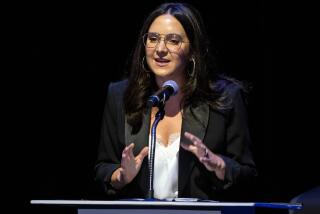‘60s Sexual Revolution Didn’t Occur, Kinsey Study Says
- Share via
NEW YORK — Despite all those explicit magazines and movies, those down-to-earth books about relationships, the beads, bikinis, hippies and protests, three Kinsey Institute researchers announced Thursday that America did not undergo a sexual revolution in the 1960s.
A long delayed survey of 3,018 adults in 1970, made public in New York, reported that America’s “patterns of sexual morality tended to be quite conservative” as measured by majority disapproval of extramarital sex, homosexuality, prostitution and most forms of premarital sex.
Why did it take so long for these findings to be made public? The researchers fought for years over whose name should come first on the title page.
“The purported sexual revolution of the 1960s didn’t occur,” Colin J. Williams, whose name finally ended up second, told a Manhattan news conference. “In terms of public morality, the American population tends to be very conservative and has continued that way.”
Williams hastened to add, however, that “most Americans enjoy sex--as long as it is in a stable relationship.”
In 1970, under the sponsorship of the Institute for Sex Research at Indiana University, the adults were interviewed by the National Opinion Research Center at the University of Chicago. But when it came time to analyze the data, fights broke out between two of the principal social scientists.
In an introduction to the survey “Sex and Morality in the U.S.”--published in book form by Wesleyan University--Prof. Hubert J. O’Gorman of that university sought to reconstruct the long delay. He said that Williams, a trustee and sociologist on the institute’s staff, was put in charge of the project because of the “increasingly fragile working relationship” between Albert D. Klassen and Eugene E. Levitt, the two scientists.
By 1980, Williams believed that he had written so much of the manuscript that he was entitled to be listed as its first author. The other trustees agreed, listing Klassen as the second author. But they awarded Klassen, who also disagreed with some of the manuscript’s content, the largest share of any royalties.
When Klassen and Levitt strenuously objected to this arrangement, prospective publishers threw up their hands and lost any interest in the book. Finally, in 1987, the authors settled their differences. Klassen’s name was to come first, Williams would be the book’s official spokesman and royalties would be apportioned equally.
Arguing that America did not undergo a sexual revolution, the researchers cited data showing 72% of those interviewed said it was always wrong to have extramarital sex, while 79% disapproved of homosexual relations.
More than 75% of those interviewed in 1970 said homosexuals should not be allowed to work as judges, schoolteachers and ministers. Almost 68% said homosexuals should not be doctors.
A majority of the respondents favored laws against prostitution, homosexuality and extramarital sex. Twenty-nine percent approved of outlawing premarital sex.
“Why did the idea that a sexual revolution become so widely accepted in the United States?” the authors asked.
“One reason seems apparent. The idea that a sexual revolution has occurred or that sexual morality has broken down . . . has enjoyed a vogue at various times (and) seems to emerge in conjunction with unsettling social changes, for example, during and after wars,” they concluded.
“It should not be surprising, therefore, that the idea surfaced again in the United States in the late 1960s, a time of domestic turmoil over the war in Asia, civil rights battles, political assassinations, the renewal of feminism, Vatican II, experimentation with drugs and so on. Amid all these convulsions in the social fabric, the idea of radical (‘revolutionary’) changes in the sexual sphere seemed logical enough.”






